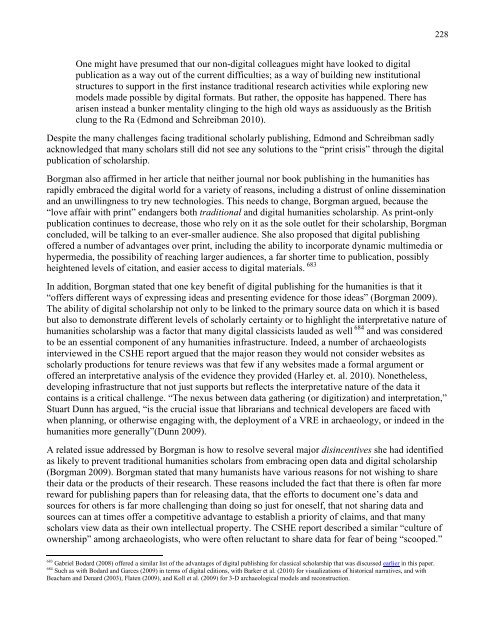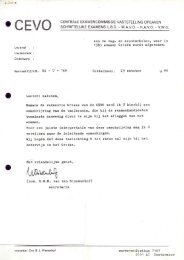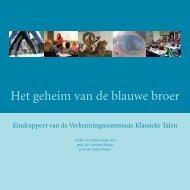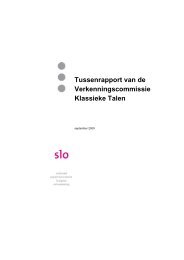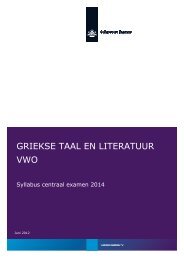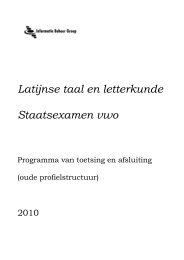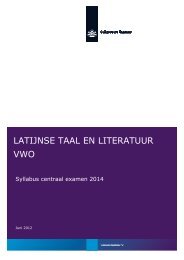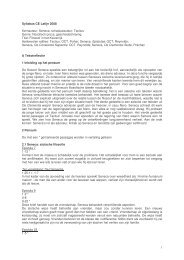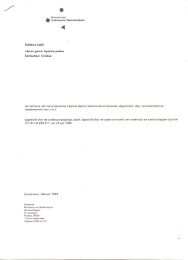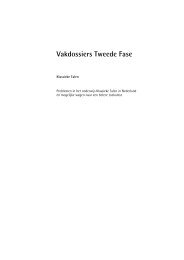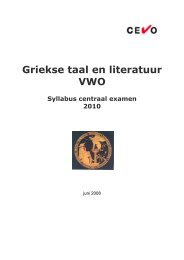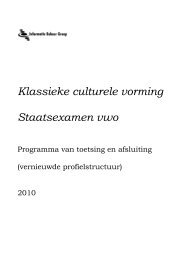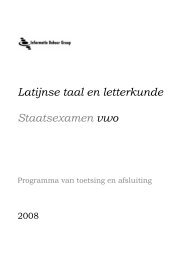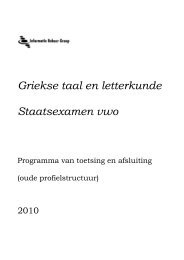Rome Wasn't Digitized in a Day - Council on Library and Information ...
Rome Wasn't Digitized in a Day - Council on Library and Information ...
Rome Wasn't Digitized in a Day - Council on Library and Information ...
You also want an ePaper? Increase the reach of your titles
YUMPU automatically turns print PDFs into web optimized ePapers that Google loves.
228<br />
One might have presumed that our n<strong>on</strong>-digital colleagues might have looked to digital<br />
publicati<strong>on</strong> as a way out of the current difficulties; as a way of build<str<strong>on</strong>g>in</str<strong>on</strong>g>g new <str<strong>on</strong>g>in</str<strong>on</strong>g>stituti<strong>on</strong>al<br />
structures to support <str<strong>on</strong>g>in</str<strong>on</strong>g> the first <str<strong>on</strong>g>in</str<strong>on</strong>g>stance traditi<strong>on</strong>al research activities while explor<str<strong>on</strong>g>in</str<strong>on</strong>g>g new<br />
models made possible by digital formats. But rather, the opposite has happened. There has<br />
arisen <str<strong>on</strong>g>in</str<strong>on</strong>g>stead a bunker mentality cl<str<strong>on</strong>g>in</str<strong>on</strong>g>g<str<strong>on</strong>g>in</str<strong>on</strong>g>g to the high old ways as assiduously as the British<br />
clung to the Ra (Edm<strong>on</strong>d <strong>and</strong> Schreibman 2010).<br />
Despite the many challenges fac<str<strong>on</strong>g>in</str<strong>on</strong>g>g traditi<strong>on</strong>al scholarly publish<str<strong>on</strong>g>in</str<strong>on</strong>g>g, Edm<strong>on</strong>d <strong>and</strong> Schreibman sadly<br />
acknowledged that many scholars still did not see any soluti<strong>on</strong>s to the “pr<str<strong>on</strong>g>in</str<strong>on</strong>g>t crisis” through the digital<br />
publicati<strong>on</strong> of scholarship.<br />
Borgman also affirmed <str<strong>on</strong>g>in</str<strong>on</strong>g> her article that neither journal nor book publish<str<strong>on</strong>g>in</str<strong>on</strong>g>g <str<strong>on</strong>g>in</str<strong>on</strong>g> the humanities has<br />
rapidly embraced the digital world for a variety of reas<strong>on</strong>s, <str<strong>on</strong>g>in</str<strong>on</strong>g>clud<str<strong>on</strong>g>in</str<strong>on</strong>g>g a distrust of <strong>on</strong>l<str<strong>on</strong>g>in</str<strong>on</strong>g>e dissem<str<strong>on</strong>g>in</str<strong>on</strong>g>ati<strong>on</strong><br />
<strong>and</strong> an unwill<str<strong>on</strong>g>in</str<strong>on</strong>g>gness to try new technologies. This needs to change, Borgman argued, because the<br />
“love affair with pr<str<strong>on</strong>g>in</str<strong>on</strong>g>t” endangers both traditi<strong>on</strong>al <strong>and</strong> digital humanities scholarship. As pr<str<strong>on</strong>g>in</str<strong>on</strong>g>t-<strong>on</strong>ly<br />
publicati<strong>on</strong> c<strong>on</strong>t<str<strong>on</strong>g>in</str<strong>on</strong>g>ues to decrease, those who rely <strong>on</strong> it as the sole outlet for their scholarship, Borgman<br />
c<strong>on</strong>cluded, will be talk<str<strong>on</strong>g>in</str<strong>on</strong>g>g to an ever-smaller audience. She also proposed that digital publish<str<strong>on</strong>g>in</str<strong>on</strong>g>g<br />
offered a number of advantages over pr<str<strong>on</strong>g>in</str<strong>on</strong>g>t, <str<strong>on</strong>g>in</str<strong>on</strong>g>clud<str<strong>on</strong>g>in</str<strong>on</strong>g>g the ability to <str<strong>on</strong>g>in</str<strong>on</strong>g>corporate dynamic multimedia or<br />
hypermedia, the possibility of reach<str<strong>on</strong>g>in</str<strong>on</strong>g>g larger audiences, a far shorter time to publicati<strong>on</strong>, possibly<br />
heightened levels of citati<strong>on</strong>, <strong>and</strong> easier access to digital materials. 683<br />
In additi<strong>on</strong>, Borgman stated that <strong>on</strong>e key benefit of digital publish<str<strong>on</strong>g>in</str<strong>on</strong>g>g for the humanities is that it<br />
“offers different ways of express<str<strong>on</strong>g>in</str<strong>on</strong>g>g ideas <strong>and</strong> present<str<strong>on</strong>g>in</str<strong>on</strong>g>g evidence for those ideas” (Borgman 2009).<br />
The ability of digital scholarship not <strong>on</strong>ly to be l<str<strong>on</strong>g>in</str<strong>on</strong>g>ked to the primary source data <strong>on</strong> which it is based<br />
but also to dem<strong>on</strong>strate different levels of scholarly certa<str<strong>on</strong>g>in</str<strong>on</strong>g>ty or to highlight the <str<strong>on</strong>g>in</str<strong>on</strong>g>terpretative nature of<br />
humanities scholarship was a factor that many digital classicists lauded as well 684 <strong>and</strong> was c<strong>on</strong>sidered<br />
to be an essential comp<strong>on</strong>ent of any humanities <str<strong>on</strong>g>in</str<strong>on</strong>g>frastructure. Indeed, a number of archaeologists<br />
<str<strong>on</strong>g>in</str<strong>on</strong>g>terviewed <str<strong>on</strong>g>in</str<strong>on</strong>g> the CSHE report argued that the major reas<strong>on</strong> they would not c<strong>on</strong>sider websites as<br />
scholarly producti<strong>on</strong>s for tenure reviews was that few if any websites made a formal argument or<br />
offered an <str<strong>on</strong>g>in</str<strong>on</strong>g>terpretative analysis of the evidence they provided (Harley et. al. 2010). N<strong>on</strong>etheless,<br />
develop<str<strong>on</strong>g>in</str<strong>on</strong>g>g <str<strong>on</strong>g>in</str<strong>on</strong>g>frastructure that not just supports but reflects the <str<strong>on</strong>g>in</str<strong>on</strong>g>terpretative nature of the data it<br />
c<strong>on</strong>ta<str<strong>on</strong>g>in</str<strong>on</strong>g>s is a critical challenge. “The nexus between data gather<str<strong>on</strong>g>in</str<strong>on</strong>g>g (or digitizati<strong>on</strong>) <strong>and</strong> <str<strong>on</strong>g>in</str<strong>on</strong>g>terpretati<strong>on</strong>,”<br />
Stuart Dunn has argued, “is the crucial issue that librarians <strong>and</strong> technical developers are faced with<br />
when plann<str<strong>on</strong>g>in</str<strong>on</strong>g>g, or otherwise engag<str<strong>on</strong>g>in</str<strong>on</strong>g>g with, the deployment of a VRE <str<strong>on</strong>g>in</str<strong>on</strong>g> archaeology, or <str<strong>on</strong>g>in</str<strong>on</strong>g>deed <str<strong>on</strong>g>in</str<strong>on</strong>g> the<br />
humanities more generally”(Dunn 2009).<br />
A related issue addressed by Borgman is how to resolve several major dis<str<strong>on</strong>g>in</str<strong>on</strong>g>centives she had identified<br />
as likely to prevent traditi<strong>on</strong>al humanities scholars from embrac<str<strong>on</strong>g>in</str<strong>on</strong>g>g open data <strong>and</strong> digital scholarship<br />
(Borgman 2009). Borgman stated that many humanists have various reas<strong>on</strong>s for not wish<str<strong>on</strong>g>in</str<strong>on</strong>g>g to share<br />
their data or the products of their research. These reas<strong>on</strong>s <str<strong>on</strong>g>in</str<strong>on</strong>g>cluded the fact that there is often far more<br />
reward for publish<str<strong>on</strong>g>in</str<strong>on</strong>g>g papers than for releas<str<strong>on</strong>g>in</str<strong>on</strong>g>g data, that the efforts to document <strong>on</strong>e’s data <strong>and</strong><br />
sources for others is far more challeng<str<strong>on</strong>g>in</str<strong>on</strong>g>g than do<str<strong>on</strong>g>in</str<strong>on</strong>g>g so just for <strong>on</strong>eself, that not shar<str<strong>on</strong>g>in</str<strong>on</strong>g>g data <strong>and</strong><br />
sources can at times offer a competitive advantage to establish a priority of claims, <strong>and</strong> that many<br />
scholars view data as their own <str<strong>on</strong>g>in</str<strong>on</strong>g>tellectual property. The CSHE report described a similar “culture of<br />
ownership” am<strong>on</strong>g archaeologists, who were often reluctant to share data for fear of be<str<strong>on</strong>g>in</str<strong>on</strong>g>g “scooped.”<br />
683 Gabriel Bodard (2008) offered a similar list of the advantages of digital publish<str<strong>on</strong>g>in</str<strong>on</strong>g>g for classical scholarship that was discussed earlier <str<strong>on</strong>g>in</str<strong>on</strong>g> this paper.<br />
684 Such as with Bodard <strong>and</strong> Garces (2009) <str<strong>on</strong>g>in</str<strong>on</strong>g> terms of digital editi<strong>on</strong>s, with Barker et al. (2010) for visualizati<strong>on</strong>s of historical narratives, <strong>and</strong> with<br />
Beacham <strong>and</strong> Denard (2003), Flaten (2009), <strong>and</strong> Koll et al. (2009) for 3-D archaeological models <strong>and</strong> rec<strong>on</strong>structi<strong>on</strong>.


